A staple in any baker’s kitchen, vanilla buttercream frosting is deliciously soft, creamy, and sweet. My favorite recipe for American vanilla buttercream is simple to make and is easily piped onto cakes and cupcakes for a truly memorable dessert.
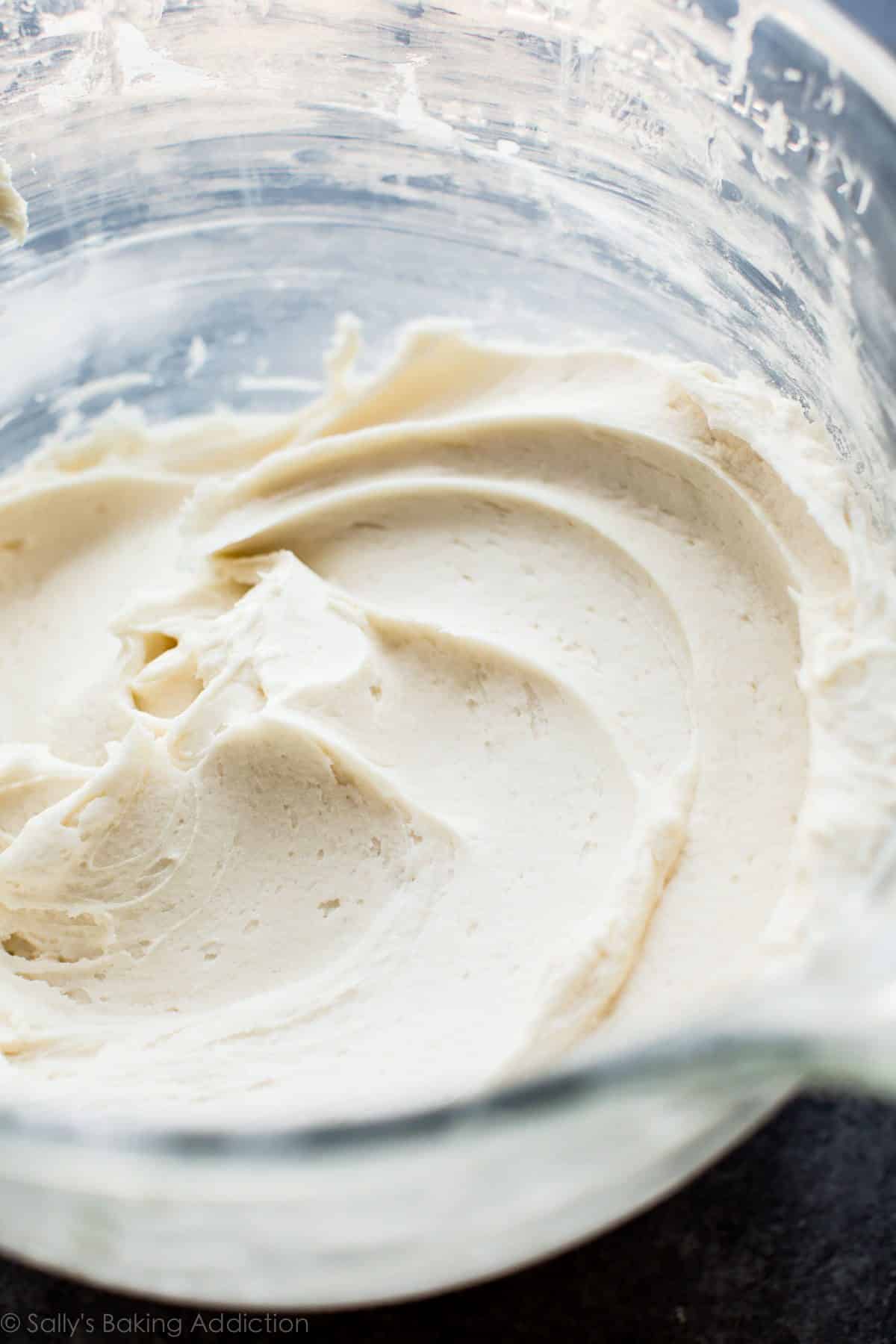
Finally! A completely separate post for the most common recipe in any baker’s repertoire: vanilla buttercream frosting. This is my favorite vanilla buttercream recipe. There’s nothing fancy, crazy, or complicated about it, but the flavor and texture will certainly taste like you added something special.
But guess what? You didn’t. It’s our little secret.
How to Make American Vanilla Buttercream Frosting
American vanilla buttercream is incredibly simple and much easier than, say, Swiss meringue buttercream. From mixing bowl to decorating cupcakes in less than 10 minutes! Here’s how to make it:
- Beat butter until creamy. Make sure your butter is softened to room temperature before beginning. Use a hand or stand mixer to beat until smooth and creamy.
- Add sugar, cream, and vanilla extract. Beat on low speed until these ingredients are incorporated, then bump up the mixer to medium-high speed. At this point, you can add more confectioners’ sugar if the frosting is too thin or a splash of heavy cream if it’s too thick.
- Taste and salt. Add a pinch of salt to offset the sweetness. Trust me on this one!
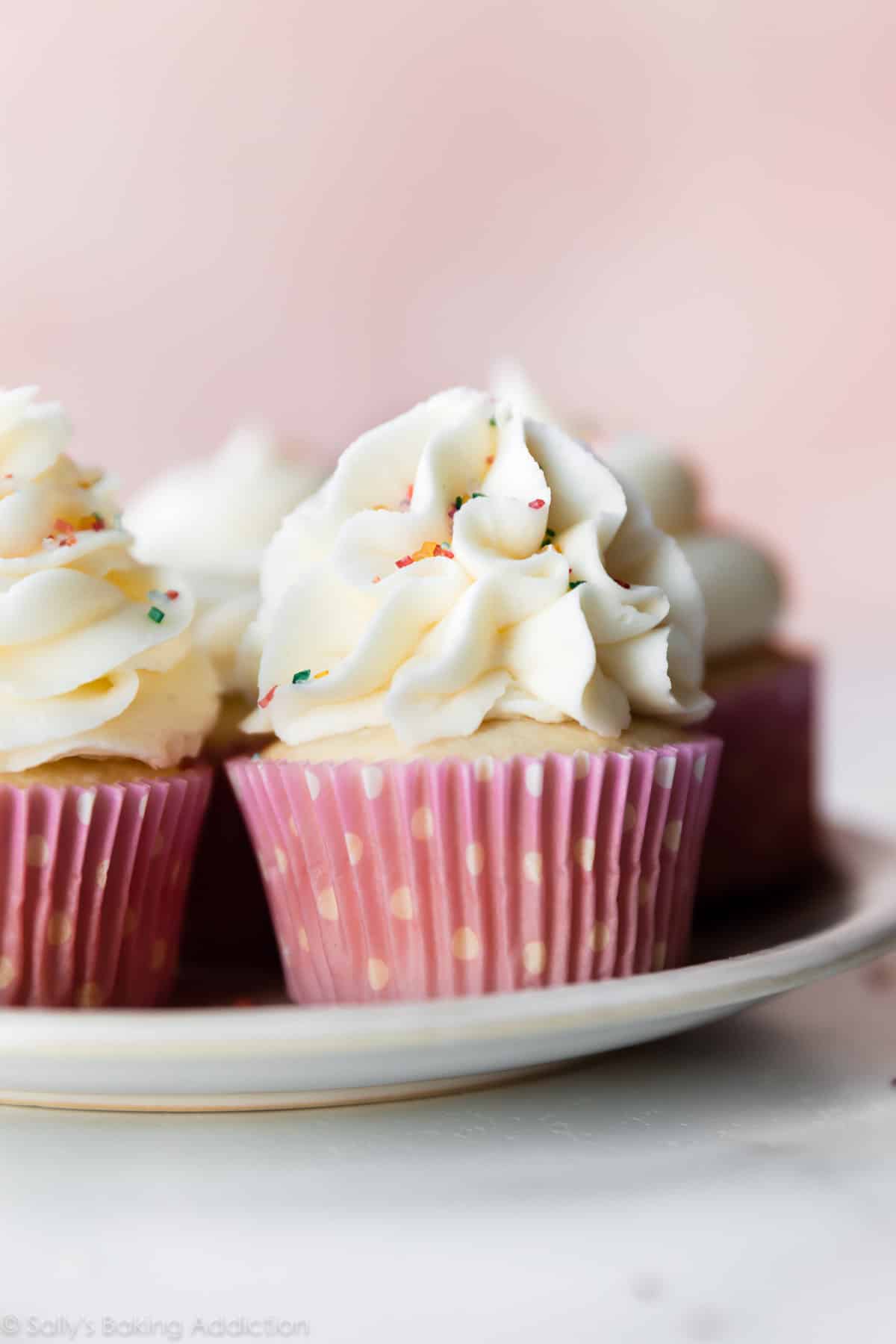
Buttercream Frosting Ingredients
Buttercream ingredients hardly differ between recipes, but the ratio of ingredients does vary. I’m here to tell you that this careful buttercream formula works EVERY time—my recipe is perfection.
- Butter: We can’t have buttercream without butter. Though salted is fine, I recommend using unsalted butter so you can control the added salt. Whichever you use, make sure you are using room temperature butter.
- Confectioners’ Sugar: Sweetens vanilla buttercream and adds stability and pipe-ability to the frosting.
- Heavy Cream: Though whole milk or half-and-half are perfectly acceptable, use heavy cream for maximum creaminess and richness.
- Pure Vanilla Extract: Adds that glorious vanilla flavor. And if you use homemade vanilla extract, even better.
- Salt: Offsets the sweetness and adds that little something extra.
This recipe also serves as the jumping point for strawberry buttercream frosting and the cinnamon-swirl frosting from snickerdoodle cupcakes.
For something lighter and less sweet, I recommend this whipped frosting.
Decorating with Buttercream Frosting
The word “creamy” doesn’t even do this stuff justice. But even though it’s supremely creamy, this vanilla buttercream holds its shape beautifully. It’s perfect for piping even the most complicated and intricate designs. When decorating cakes and cupcakes, I gravitate towards the following 5 piping tips. Each creates a completely different look, so that’s why it’s a great collection if you’re just starting out. And these tips won’t break the bank—they’re each pretty inexpensive.
- Wilton 1M (Rose) – a classic piping tip and the easy buttercream rose is a staple decoration. This same tip can also produce a decoration that resembles soft serve ice cream.
- Wilton 8B – one of my all-time favorites.
- Ateco 849 – it’s a pretty wide piping tip. You can make a rose, a soft-serve swirl, or a super easy ruffled look.
- Wilton 12 small round – since it doesn’t have any detailed edges, I love using this tip for silky creamy frostings such as salted caramel frosting and cream cheese frosting.
- Ateco 808 large round – it’s also a round tip, but it’s much larger. Its decoration looks like a big fluffy cloud!
Want to see how to decorate cupcakes? Here’s my how to use piping tips video. And here is how we use this frosting to decorate easy Halloween cupcakes!
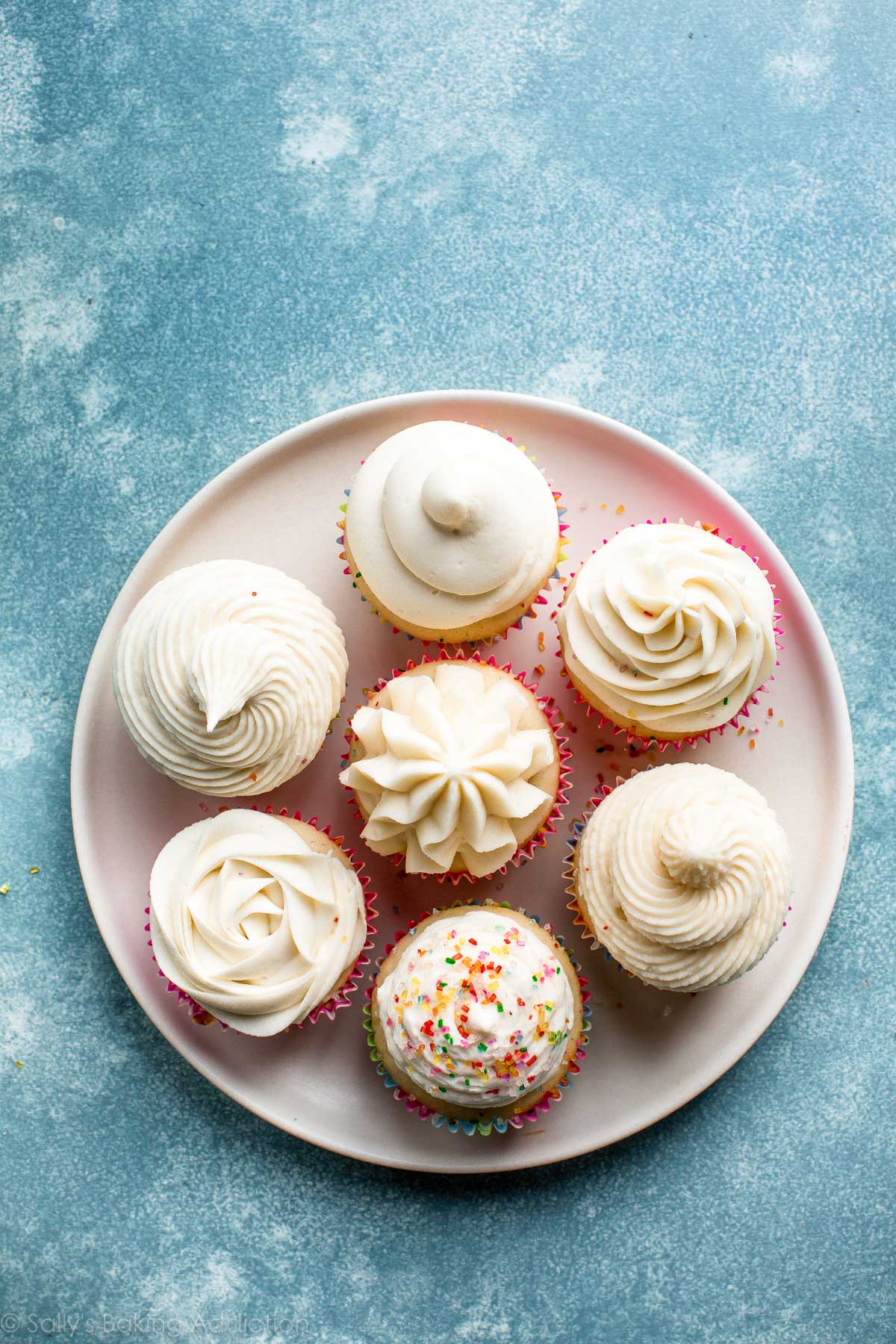
How to Rid Vanilla Buttercream of Air Bubbles
Over-whipping vanilla buttercream creates air bubbles. The taste is no different, but the buttercream is no longer smooth and velvety. Here’s how to get rid of air bubbles in your frosting:
Ditch the mixer. Grab a wooden or metal spoon and begin stirring the buttercream by hand. Mash the frosting up against the side of the bowl to “pop” the bubbles. Do this until most of the air bubbles pop, about 1–2 minutes. This trick requires a lot of arm muscle!
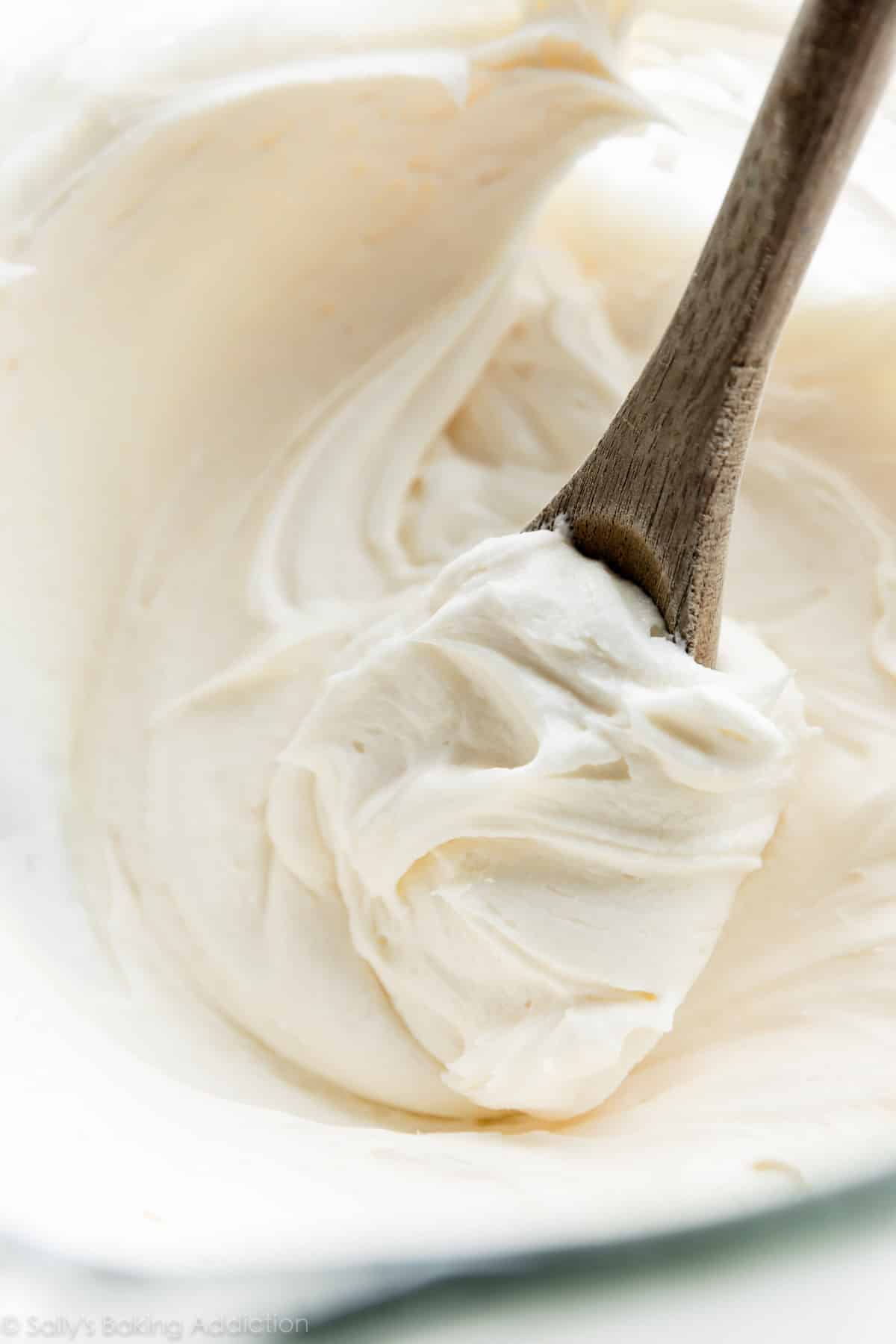
Yes, absolutely! You can add various extracts, in addition to the vanilla extract. If doing so, I recommend reducing the vanilla extract to 1 teaspoon. Extracts you can add include 1/2 teaspoon peppermint extract, 1/2 teaspoon maple extract, 1/2 teaspoon coconut extract, 1/2 teaspoon orange extract, or 1/4 teaspoon almond extract. Taste the buttercream, and, if desired, beat in an extra splash of extract. Instead of adding extracts, you can keep the vanilla extract as 2 teaspoons, and beat in 1/4 teaspoon of ground cinnamon. You could also try this Lemon Buttercream, Chocolate Buttercream, Chai Spice Buttercream, or White Chocolate Buttercream.
Yes, this is American-style buttercream and it’s sweet. If you’re looking for a less-sweet option, try this Whipped Frosting or Swiss Meringue Buttercream.
There are 2 options. You can freeze the buttercream for up to 3 months, and those detailed instructions are in the recipe card below. You can also make it up to 3 days ahead and refrigerate it. Remove from the refrigerator and use a mixer to beat it with a splash of room-temperature heavy cream, half-and-half, or milk to help make it creamy and smooth again.
You can keep the buttercream white or tint it with food coloring. To color it, beat in a drop of gel food coloring. (Here is my favorite brand.) I recommend gel food coloring instead of liquid food coloring because liquid can throw off the consistency. For lighter tints, I recommend using the tip of a toothpick to add color, rather than squeezing a whole drop into the bowl of frosting.
Buttercream frosting is typically fine at room temperature for up to 1 day. After that, it’s best to refrigerate it. That said, do what you feel comfortable with; if your kitchen is particularly warm, you may want to refrigerate it on day 1.
Ways to Use Vanilla Buttercream Frosting
I’ve used this vanilla buttercream more times than I can even fathom, but I love it most paired with chocolate cupcakes or vanilla cupcakes. If you scale it up (slightly) you can use it to frost a layered cake, like I do with my white cake recipe (use this how to assemble a layer cake post as a guide). If you add slightly more heavy cream, you can use this as the base for whipped buttercream, as I recommend with my vanilla sheet cake. It also tastes delicious with:
- Lemon Cupcakes
- Confetti Cupcakes
- Vanilla Cake
- Soft Cakey Sugar Cookies
- Brown Sugar Butterscotch Cupcakes
- Checkerboard Cake
- Sugar Cookie Bars
- Chocolate Cupcakes
- Piñata Cupcakes
- Sugar Cookie Cake
By the way, if you make my homemade vanilla extract, this buttercream tastes even more fantastic. 🙂
Print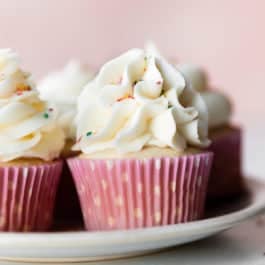
Vanilla Buttercream Frosting
- Prep Time: 5 minutes
- Cook Time: 0 minutes
- Total Time: 5 minutes
- Yield: 2.5 cups
- Category: Frosting
- Method: Mixing
- Cuisine: American
Description
This is my favorite vanilla buttercream. It’s the perfect vanilla frosting that’s simple, creamy and smooth and tastes unbelievable on vanilla cupcakes!
Ingredients
- 1 cup (16 Tbsp; 226g) unsalted butter, softened to room temperature
- 4 – 5 cups (480-600g) confectioners’ sugar (see note)
- 1/4 cup (60ml) heavy cream, half-and-half, or whole milk, at room temperature
- 2 teaspoons pure vanilla extract
- salt, to taste
Instructions
- With a handheld or stand mixer fitted with a paddle attachment, beat the butter on medium speed until creamy, about 2 minutes. Add 4 and 1/2 cups confectioners’ sugar, the heavy cream, and vanilla extract. Beat on low speed for 30 seconds, then increase to medium-high speed and beat for 2 full minutes. Taste. Add a pinch of salt if frosting is too sweet. I always add 1/8 teaspoon.
- Adjust if needed: You can control the consistency at this point—add up to 1/2 cup more confectioners’ sugar if frosting is too thin or more heavy cream if frosting is too thick (add only 1 Tablespoon at a time, beat together, then taste and add more if desired).
- Use immediately or cover tightly and store for up to 1 week in the refrigerator or up to 3 months in the freezer. After freezing, thaw in the refrigerator then beat the frosting on medium speed for a few seconds so it’s creamy again. After thawing or refrigerating, beating in a splash of heavy cream or milk will help thin the frosting out again, if needed.
Notes
- Freezing Instructions: Freeze in an airtight container for up to 3 months. Thaw in the refrigerator overnight, then beat the frosting on medium speed for a few seconds so it’s creamy again. After thawing or refrigerating, beating in a splash of room temperature heavy cream, half-and-half, or milk will help thin the frosting out again, if needed.
- Special Tools (affiliate links): Electric Mixer (Handheld or Stand Mixer)
- Quantity: This recipe is enough to frost 12-16 cupcakes or a thin layer on a 9×13 inch quarter sheet cake. Follow the ratios written in this white cake for a two layer cake, or for a three layer cake use the ratios in this confetti cake.
- Confectioners’ Sugar: If your confectioners’ sugar is particularly lumpy, I recommend sifting it 1-2x before measuring and using.
- Heavy Cream: I love using heavy cream for the creamiest consistency. You can use half-and-half or whole milk instead if needed. The lower the fat, the less creamy your buttercream will be. Whichever you use, make sure it’s at room temperature. Otherwise your frosting could separate or appear grainy.
- Decorating Tips: Be sure to check out my post on how to use piping tips (with video tutorial!), and my recommendations for essential cake baking & decorating tools.














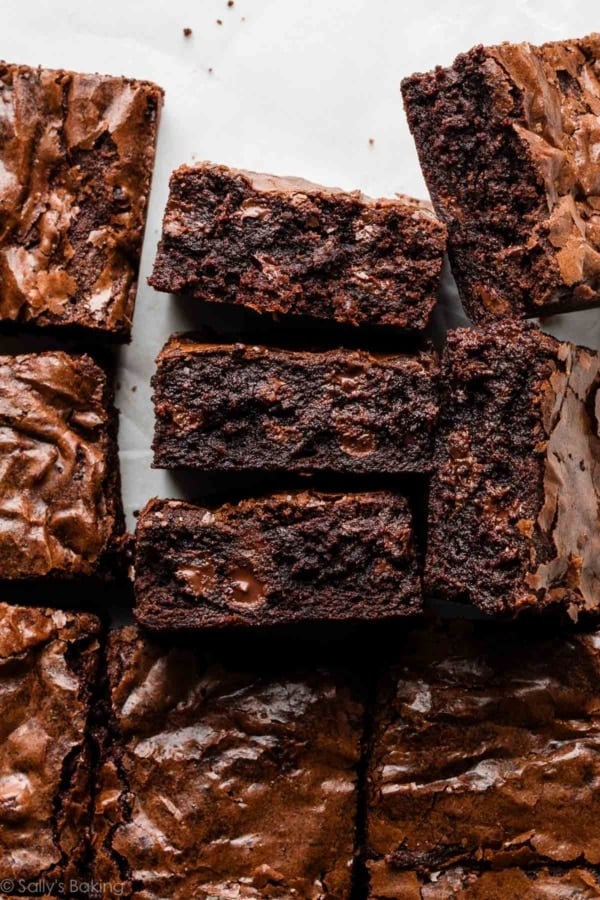


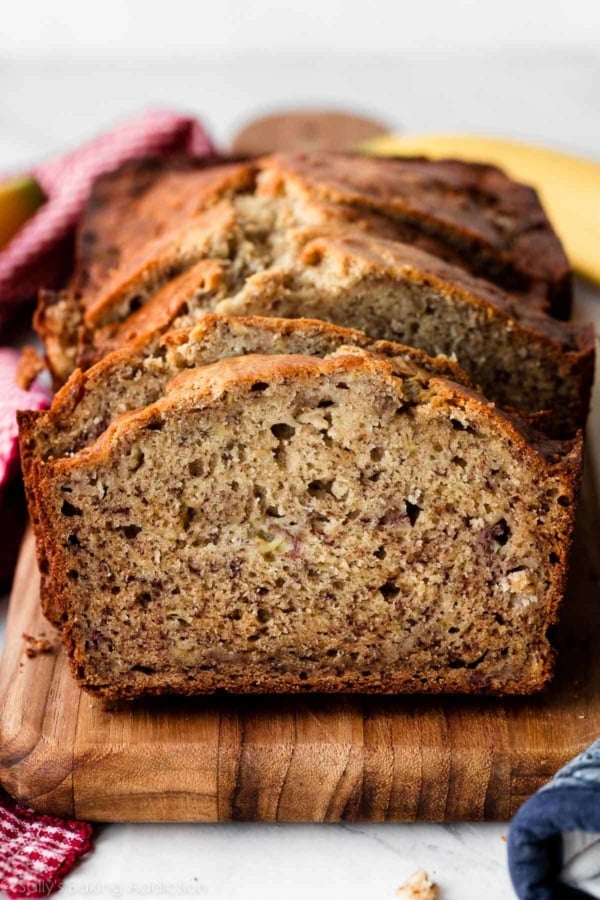

Reader Comments and Reviews
This is a delicious recipe, thank you!
Oh man – this is to die for!! I used it on Sally’s One Bowl Lemon Cupcakes and they are SOOOOOO good.
I love all your recipes! Icingsnare perfect. Never to sweet but, just right.
Hi, love your recipes! I’m now going to try to add gel coloring to this vanilla buttercream. Is there a certain time to put in the gel coloring? I want to avoid over beating the frosting. Thanks!
Hi Mayra, you can add it at the same time as the vanilla extract. Enjoy!
I’ve used your recipes for years and they are always my go to if you have one available for what I’m looking to make. Just wanted to thank you for sharing your passion with us!
Can I use food colouring in it
Hi Kate, gel food coloring is our recommendation!
Hi there! I’m using this to frost your Funfetti Cupcakes! I was wondering if it would be ok to add fruity pebbles for a fun effect, or would that affect the texture in a negative way?
Hi Chantal, we haven’t tested it, but think it should be fine! Let us know if you try.
I love your recipes and they never fail. I need to frost a two 9 inch cake and 36 cupcakes. Do you have this recipe adjusted to cover that amount? Thanks
Hi Nadine, Follow the ratios written in this white cake for the two layer cake. This recipe here is enough to frost 12-16 cupcakes and can easily be doubled or tripled as needed.
Thank you.
I have been following your recipes for some time now and find yours are tried and true.
Thank you for sharing your passion for baking.
Hi,
Will this buttercream stay on a cake in hot summer weather ? Or could you please recommend a frosting recipe that won’t melt of a cake
Hi Rameen, most frostings, including this one, are butter-based, so will melt in heat. It is best to keep cakes in a cooler spot until close to serving to prevent melting.
Will your vanilla frosting firm up enough to support a fondant figure standing on it please ?
Hi Kj, This frosting should work well under fondant.
Hi! I was wondering if this frosting will crust and if so how long should it take? Thanks!
Hi Tauriel, This buttercream is very stable, but won’t harden with a crust. You can replace some of the butter with shortening for a “crustier” buttercream.
Ok, thank you!
Is it possible to make this a chocolate buttercream? If so, how?
Hi Maggie, we’d recommend you make this chocolate buttercream recipe.
How do I make cupcake frosting really white? I’m making Star Wars stormtropper cupcakes, so need white white frosting! Thanks!
Hi Suzy, you can add a (very!) small drop of purple food coloring, which will help offset the yellow hues.
Hi!! Is this good for cake decorating, I want to make the pinterest heart cake but this is my first time and I don’t know how much I will need and if using this butter cream recipe will be good. I’d appreciate it if you could give me some advice for this 🙂 Thank you so much!
Hi Yuna, yes, this frosting is wonderful for decorating cakes!
So grateful for this recipe! I have always been a frosting in a can person but I needed to make a cake for a family event. I am a “follow the recipe exactly” person and this came out perfect and delicious! The tips were so helpful for me!
Hi, Sally! I’m making your coconut cake and decided to use your buttercream recipe instead of the cream cheese icing. In the notes it says to use coconut milk in place of milk or heavy cream and to add 1/2 tsp coconut extract. Is that in place of or in addition to the vanilla? I’m guessing in place of, but want to be sure! Thank you!!
Hi Heather, we would still add the vanilla extract. Enjoy!
Is this enough frosting to pipe the edges of your chocolate chip cookie pizza?
Thank you!
I made this and frosted our cake but I’m finding it too sweet ! I only added a dash of salt with my fingers.. would adding more salt help? Love your site and all the recipes you share
Hi Jennifer! This is a sweeter buttercream. You can try adding more salt, or you might enjoy one of these less sweet options instead: Swiss meringue buttercream, whipped buttercream, cream cheese frosting.